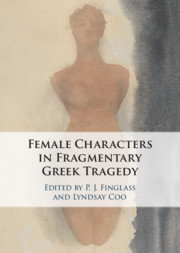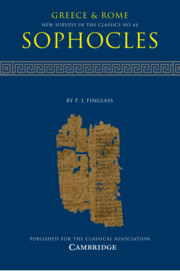Female Characters in Fragmentary Greek Tragedy
$103.00 (C)
- Editors:
- P. J. Finglass, University of Bristol
- Lyndsay Coo, University of Bristol
- Date Published: July 2020
- availability: Available
- format: Hardback
- isbn: 9781108495141
$
103.00
(C)
Hardback
Other available formats:
Paperback, eBook
Looking for an examination copy?
If you are interested in the title for your course we can consider offering an examination copy. To register your interest please contact [email protected] providing details of the course you are teaching.
-
How were women represented in Greek tragedy? This question lies at the heart of much modern scholarship on ancient drama, yet it has typically been approached using evidence drawn only from the thirty-two tragedies that survive complete - neglecting tragic fragments, especially those recently discovered and often very substantial fragmentary papyri from plays that had been thought lost. Drawing on the latest research on both gender in tragedy and on tragic fragments, the essays in this volume examine this question from a fresh perspective, shedding light on important mythological characters such as Pasiphae, Hypsipyle, and Europa, on themes such as violence, sisterhood, vengeance, and sex, and on the methodology of a discipline which needs to take fragmentary evidence to heart in order to gain a fuller understanding of ancient tragedy. All Greek is translated to ensure wide accessibility.
Read more- Provides the first large-scale investigation of female characters in Greek tragedy from the perspective of the fragmentary plays
- Offers a new methodological model for how to bring fragmentary tragedy into the mainstream of literary scholarship
- Makes texts that are often thought to be the preserve of philological specialists accessible to a wide audience of students and scholars
Customer reviews
Not yet reviewed
Be the first to review
Review was not posted due to profanity
×Product details
- Date Published: July 2020
- format: Hardback
- isbn: 9781108495141
- length: 300 pages
- dimensions: 250 x 175 x 20 mm
- weight: 0.65kg
- contains: 2 b/w illus.
- availability: Available
Table of Contents
Preface
Acknowledgements
1. Introduction Lyndsay Coo and P. J. Finglass
Part I. Themes:
2. Female violence towards women and girls in Greek tragedy Fiona McHardy
3. Greek tragedy and the theatre of sisterhood Lyndsay Coo
4. Women in love in the fragmentary plays of Sophocles Alan H. Sommerstein
5. Heterosexual bonding in the fragments of Euripides Helene P. Foley
6. Suffering in silence: victims of rape on the tragic stage P. J. Finglass
Part II. Plays:
7. Dancing on the plain of the sea: gender and theatrical space in Aeschylus' Achilles trilogy Anna Uhlig
8. Europe revisited: an experiment in characterisation Niall W. Slater
9. When mothers turn bad: the perversion of the maternal ideal in Sophocles' Eurypylus Robert Cowan
10. The music one desires: Hypsipyle and Aristophanes' 'muse of Euripides' Caleb Simone
11. Fragmented self and fragmented responsibility: Pasiphae in Euripides' Cretans Luigi Battezzato
12. Female agency in Euripides' Hypsipyle James H. Kim On Chong-Gossard
13. Making Medea Medea Matthew Wright
Bibliography
Index of subjects
Index of Greek
Index of passages discussed.
Sorry, this resource is locked
Please register or sign in to request access. If you are having problems accessing these resources please email [email protected]
Register Sign in» Proceed
You are now leaving the Cambridge University Press website. Your eBook purchase and download will be completed by our partner www.ebooks.com. Please see the permission section of the www.ebooks.com catalogue page for details of the print & copy limits on our eBooks.
Continue ×Are you sure you want to delete your account?
This cannot be undone.
Thank you for your feedback which will help us improve our service.
If you requested a response, we will make sure to get back to you shortly.
×

